#2018 FIFA World Cup Winners
Text
FIFA World Cup Winners and Runners List from 1930 to 2022
FIFA World Cup Winners and Runners List from 1930 to 2022
The FIFA World Cup 2022 is currently going on in Qatar. 2022 winners and runners have yet to decide. In this article, check out FIFA World Cup Winners and runners.
Football is widely perceived as the most popular sport in the world, and the men’s FIFA World Cup is one of the most famous tournaments in the world. The FIFA World Cup is widely recognized as the largest and most well-known…
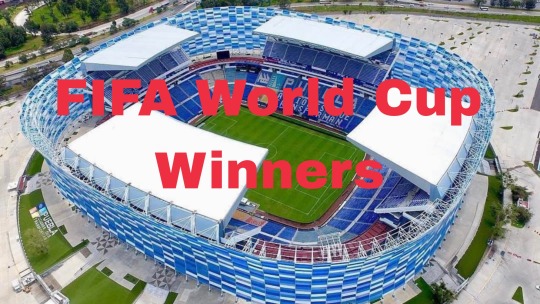
View On WordPress
0 notes
Text
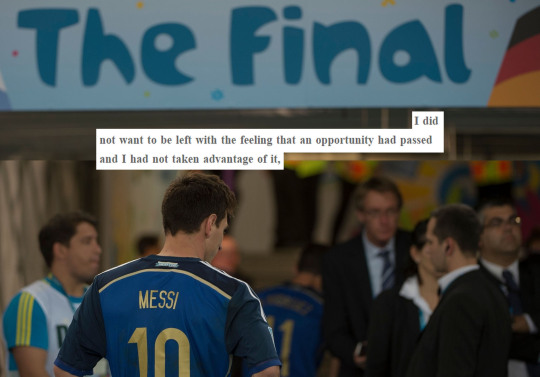
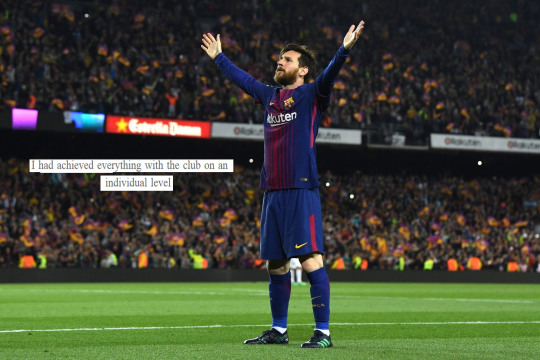
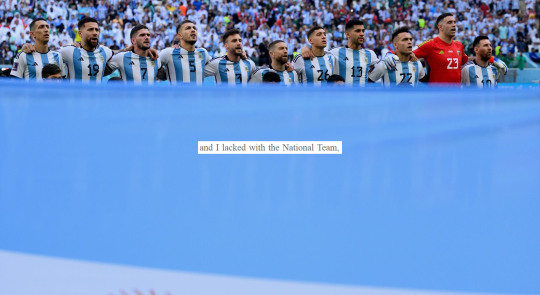


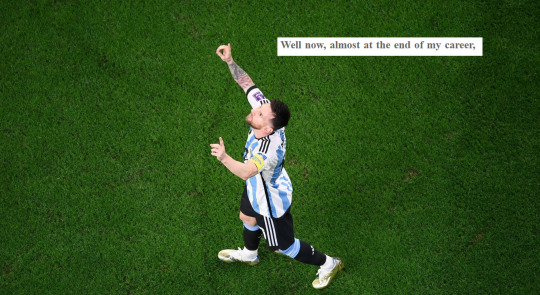

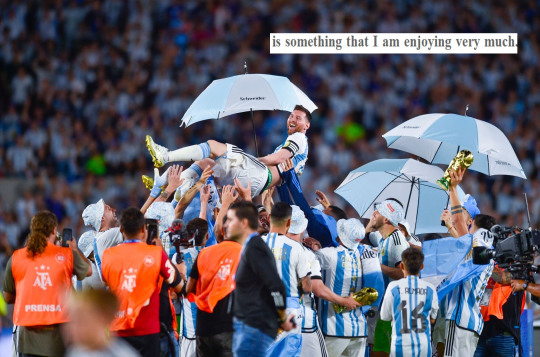
feliz cumpleaños, rey / happy birthday, king
Quotes by Lionel Messi extracted from ALTA EN EL CIELO, and cited from here. / (1) Leo Messi disapointed in match between Germany and Argentina, corresponding to the 2014 World Cup final, played at the Maracana Stadium, July 13, 2014. (Photo by Urbanandsport/NurPhoto) / (2) Lionel Messi of Barcelona celebrates after scoring his sides second goal during the La Liga match between Barcelona and Real Madrid at Camp Nou on May 6, 2018 in Barcelona, Spain. (Photo by David Ramos / (3) Team Argentina with Lionel Messi (R) of Argentina sing their national anthem prior to the FIFA World Cup Qatar 2022 Group C match between Argentina and Saudi Arabia at Lusail Stadium on November 22, 2022 in Lusail City, Qatar. (Photo by Matthias Hangst) / (4) Lionel Messi of Argentina celebrates with The FIFA World Cup Qatar 2022 Winner's Trophy after winning the FIFA World Cup on an open top bus outside the stadium during the FIFA World Cup Qatar 2022 Final match between Argentina and France at Lusail Stadium on December 18, 2022 in Lusail City, Qatar. (Photo by Michael Regan) / (5) Lionel Messi of Argentina reacts during the FIFA World Cup Qatar 2022 semi final match between Argentina and Croatia at Lusail Stadium on December 13, 2022 in Lusail City, Qatar. (Photo by Richard Heathcote) / (6) Lionel Messi of Argentina celebrates after scoring the team's first goal during the FIFA World Cup Qatar 2022 Round of 16 match between Argentina and Australia at Ahmad Bin Ali Stadium on December 03, 2022 in Doha, Qatar. (Photo by Laurence Griffiths) / (7) Lionel Messi (C) of Argentina celebrates with teammates after an international friendly between Argentina and Panama at Estadio Mas Monumental Antonio Vespucio Liberti on March 23, 2023 in Buenos Aires, Argentina. (Photo by Jam Media)
60 notes
·
View notes
Text
When the Australia players chose to release a video on Monday — three days before the start of the Women’s World Cup — criticising the gender disparity in prize money at the tournament, it was just the latest example of a team spending valuable time addressing off-field issues rather than focusing on performance on it.
In a message released via Professional Footballers Australia, they called out FIFA for failing to offer equal prize money and demanded those who run the game do more to provide opportunities for women and girls.
Players speaking out, either publicly or via other means, has been a consistent theme in the months leading up to the Women’s World Cup.
At one point this year, players from France, Spain and Canada (the fifth, sixth and seventh-best teams in the world according to FIFA rankings) were all involved in some form of dispute with their federation. More recently, players from Jamaica added their names to that list, swiftly followed by Nigeria. England, too, have had their own issues, as have South Africa.
pic.twitter.com/xjc6eaklI2
— Rebecca Spencer (@beckyspencer2) June 15, 2023
In many cases, it cast huge doubt over their participation at the biggest tournament in women’s football. For some players, it cost them the chance to compete at all.
Australia’s players do not have to worry about such consequences on this occasion — they are speaking out against FIFA rather than their federation. But it is yet another instance of off-field issues dominating the agenda.
This is nothing new for the women’s game. In recent years we’ve seen the USWNT fight a long battle with the United States Soccer Federation (US Soccer) over equal pay and working conditions, ultimately filing a gender discrimination lawsuit against the federation in 2019 (a landmark $24million/£18.8m settlement was reached in 2022, with the federation promising equal pay between the men’s and women’s national senior teams for friendlies, tournaments and World Cup matches).
We’ve also seen individual players take a stand. Chief among them: the Norway striker and global star Ada Hegerberg. The first recipient of the women’s Ballon d’Or (in 2018) and winner of six Champions League titles, Hegerberg first represented her country at the age of 15. But in the summer of 2017, she made the decision to stop playing for Norway, having become exasperated at the approach taken to women’s football and the development pathway for young girls by the Norwegian federation.
“When I took the decision, it was like a weight off my shoulders,” she said in an interview with CNN in 2019. “I’ve done what I can do to make an impact and do the best to make things better. When that doesn’t work, you have to take a choice. Life is full of difficult choices to make.”
There was immense pressure on her to return for the 2019 World Cup but Hegerberg did not waver. As her former team-mates went on to reach the quarter-finals (where they were beaten 3-0 by England), she watched from the sidelines.
Hegerberg returned to the national team in March 2022, meaning her absence lasted almost five years.
From the outside, it can be difficult to understand the effects these types of actions have on players. They’re elite athletes, used to competing hard, used to fighting for places, used to putting themselves out there to be shot at by anyone watching from near or far.
But these situations are different to the on-pitch battles players are used to. They can be divisive. Political. Nasty. They can lead players to doubt themselves, to question whether they are doing the “right” thing and just who, or what, they are doing it for.
“At a personal level, it was one of the most difficult and challenging periods of my life,” says the former 100-cap New Zealand international Sarah Gregorius, who is now director of Global Policy & Strategic Relations in Women’s Football at FIFPRO. “I wouldn’t wish that on anyone — any player or any person because it’s unbelievably difficult to have to go through something like that.”
In 2018, Gregorius was part of a New Zealand squad that felt there was a “fundamental incompatibility” between a large group of players and the head coach of the team.
Thirteen players signed a letter declaring they would not play under Austrian coach Andreas Heraf, who they accused of bullying and creating a culture of fear.
Their actions led to an investigation, not only into Heraf’s conduct but into the wider structures around the team. Heraf (who was also the technical director at New Zealand Football) resigned, as did chief executive Andy Martin, who was heavily criticised for his appointment of Heraf and subsequent defence of the then-50-year-old.
“It ended up snowballing a little bit,” says Gregorius, who explains that alongside the investigation validating the players’ allegations, finding “various levels of unprofessional and non-elite behaviour taking place”, it uncovered a culture within the New Zealand Federation that “also wasn’t fit for purpose”.
“It ended with the resignation of a few other people that were certainly not on the radar of the players,” adds Gregorius. “But I think it shows that, oftentimes, a member of technical staff, a person, is just the product of a system that has neglected players, not listened to players and certainly not taken their views into consideration adequately enough.”
Asked to explain why this was such a difficult period in her life, Gregorius says it’s relatively simple: “I really loved playing football. And I really loved playing football for my national team. And all of a sudden, that was in jeopardy. It was the case for me, it was also the case for a lot of my team-mates, and that is so unbelievably difficult for a player.
“You have to understand that it’s only under the worst of circumstances that players would opt out of that opportunity. Because it’s everything that players say that it is: it’s a huge honour, a huge privilege. A lot of the time, it’s everything that you’ve dreamed of for as long as you can remember.
“That part, at a very human level, at a player level, is so challenging. To have to go through that and to put the thing that you love the most in the world, and that has been such a core part of your identity for so long, on the line, because you’re in a situation where you’re not being respected, your rights aren’t being upheld. It’s absolutely devastating.
“For me, that was the big challenge and then seeing the mental impact that it was having on some of my team-mates as well. The ones who triggered the action and participated in it, but it also created a huge amount of uncertainty for all players.
“Being an international football player is not a part-time job. Maybe you only play in certain windows but you think about it constantly — always training for it, always preparing for it. If you’re having to do that without actually knowing if you’ll ever step foot on that field… it’s mentally very, very difficult for elite athletes to have to do that.”
Spain’s two-time Ballon d’Or winner Alexia Putellas said in March this year it is “exhausting to have to be constantly demanding improvements in order to perform better. We want the players to be able to focus 100 per cent on performing. The leaders should improve our conditions without having to ask for it all the time.”
And, speaking to The Athletic, Canada’s Julia Grosso described it as “stressful” to be preparing for a World Cup amid an ongoing dispute between the players and Canada Soccer.
“It’s definitely unfortunate that we have to go through that,” she says. “We’ve been disappointed and want more. We’re going to fight for that until we get what we deserve. It’s definitely been hard on our team. I know that my team is just a bunch of fighters. We always pull through together and, no matter what the circumstance, we’re always by each other’s sides. That’s all that matters. It’s unfortunate, we deserve a lot better — but hopefully we’ll get that.”
All of this makes it so much more impressive to recall that, in 2019, the USWNT won their fourth World Cup, three months after 28 players on the roster filed a gender discrimination lawsuit against the US Soccer. In their statement the players described “institutionalised gender discrimination” that they said had existed for years, not only affecting how much they earned but also where they played and how often, how they trained, the medical treatment and coaching they received, and how they travelled to matches.
Jeffrey Kessler, the co-chair of Winston & Strawn’s sports law practice group, was the lead attorney representing the USWNT players in 2019 and tells The Athletic the players they did an “extraordinary” job at the World Cup that year.
“What you have to remember is that the main focus of world-class athletes when they go to an event like the World Cup is doing their best to prepare for and win the games,” he said. “This focus is difficult to maintain when you are also engaging in high-visibility protest activities.
“The women on the national team in the United States really did both in Paris. They were able to bear the public pressure of fighting for equal pay in the most visible way. And they also won the World Cup.
“No one should underestimate how difficult or distracting doing both of those things at the same time could be.”
Kessler says that alongside the team’s “incredible dedication, preparation, skill, and internal fortitude”, there were two reasons in particular why the USWNT were able to do that so successfully.
Firstly, he says the players were able to use their fight for equality to further their competitive intensity and desire to win “because they wanted to show that they deserve equal pay with the men — and winning the World Cup obviously underscored that”.
Secondly, Kessler says the USWNT had great leaders, such as Megan Rapinoe and Alex Morgan (among others), who not only were able to turn the legal battle into something that unified the team but who were also willing to absorb more of the public heat, leaving their team-mates free to focus on the game.
“In any type of political protest, there are some players who are more willing to take the pressure and articulately express the point of view while still focusing on their game and preparation. That is a great help to the rest of the team-mates who might find it more difficult to do both at once.”
The ways in which players are impacted by the challenge of carrying a protest into a World Cup are very individual. Sports psychologist Sarah Murray has worked with elite female athletes and professional footballers and says it comes down to each player’s ability to “understand their ‘why’: to understand why they’re wanting to represent their country, what football means to them, and actually remaining focused on that. If that is at odds with what’s happening with protests, for example, then some players will have a difficult time psychologically to be able to switch between the competing demands”.
There are some players, says Murray, who are able to step into a “protective bubble of ‘me: the performer. Me: the player,’ and when I’m playing it doesn’t matter the badge or the context. I’m playing and that’s what I do, and I prepare in the same way.
“Players being able to manage themselves psychologically, to step into that performance bubble despite the context or the noise, is something that the very best, most skilled athletes will have the ability to do. But there will be those who may find it incredibly distracting, and it might start to impact their why or it might be linked to their why. In which case, maybe we see behavioural changes or we see their relationship with the game impacted by it.”
Could it also affect players physically? “Certainly we know that ‘the body keeps the score’,” says Murray, quoting the title of a book by Bessel van der Kolk, which explores how psychological loading or trauma plays out through the body.
“There are physiological impacts of any psychological load. Depending on how mentally heavy our mind is — how many tabs in the mental inbox we’ve got open — these things can play out in the body in terms of feeling drained or having less energy. I’m doing a lot of work around the psychophysiological responses to threat, pressure and stress because we can’t untangle the two.”
There has been a lot of talk around ‘loading’ in the women’s game ahead of this World Cup, specifically in relation to the amount of injuries we have seen to so many key players. But it’s not just physical loading that coaches should be mindful of, says Murray.
“We’ve got loading on the mind and loading on the body. Heavy on body; heavy on mind. And we have to think about what’s going on in both instances, because some things might be heavy on body but light on mind. But when something is heavy on mind, it’ll often play out as heavy on body as well.”
That’s part of the reason why Gregorius believes (and advises others, as part of her role at FIFPRO) that it is far better for players to work collectively in these instances, as opposed to individually, like Hegerberg.
“I’m not surprised that someone like Ada feels such a strong sense of conviction that she does take ownership of situations and is not afraid to step in or step out or engage in a discussion or a confrontation when things aren’t good enough,” Gregorius tells The Athletic. “But then, at the same time, we’re talking about a Ballon d’Or winner.
“An unbelievable athlete and an unbelievable person. You don’t see players of a similar profile in men’s football having to do that; she shouldn’t have to. It’s great that we have these amazing characters like her, like the Megan Rapinoes, Alex Morgans, Pernille Harders, Magdalena Erikssons of the world who do so much with their voice and their platform. But at the same time, imagine if they could just worry about football.”
Gregorius points to the work done by FIFPRO in uniting over 150 players from 25 national teams to push FIFA for improved conditions and prize money at the World Cup. The largest piece of collective action ever undertaken by women’s footballers resulted in world football’s governing body FIFA announcing a significant increase in the prize money on offer at this summer’s tournament (from $30million in 2019 to $110m).
“That’s what we’re encouraging — this long-term strategic planning that utilises the voice of the collective rather than the voice of the individual,” says Gregorius. “I always say to players: ‘Can we find a way to do this that protects you, instead of putting you at risk?”
She believes that once players take to the field in Australia and New Zealand, they will be able to follow the example of the USWNT and place their off-field battles to one side.
“I already see the tremendous amount of strength that it takes to do what these players are doing. And I think that same strength, that same resilience, and that same determination will be channelled into some unbelievable on-field performances as well. I just really hope they get the opportunity to put those performances in on the field, right?
“For me, once you get back into that mode of doing what you do best and doing what you love, I think you can really mask the impact and actually sometimes use it as fuel to make sure you give everything you have on the field — because you’ve risked so much off it.”
Kessler agrees that one strategy for players in that position is to “try to link their battles with their desire to compete”. By extension, it’s easy to surmise that the better a team does on such a big stage, the more pressure it applies to those federations accused of falling short in their provisions for female players.
“Absolutely,” says Gregorius. “But that in itself is so problematic. We’ve seen recently players in their most successful moments also have this tremendous awareness of the broader impact they can make.”
She points to the actions of the European Championship-winning Lionesses who, in the afterglow of their historic victory over Germany at Wembley last summer, wrote an open letter to the incoming UK prime minister Rishi Sunak asking them to ensure that all girls have access to football at school. It was signed by all 23 members of Sarina Wiegman’s squad.
“I am a little bit blown away that players use these huge moments of success to create long-term legacy and change,” adds Gregorius. “But it shouldn’t be that way. You shouldn’t have to win a World Cup in order for your federation to recognise gender equality.”
The battles can be exhausting and frustrating.
“Sometimes, the most difficult thing to change is certain people’s minds,” Spain defender Mapi Leon, who withdrew from selection as part of a player protest, told FIFPRO. “We’re changing, we’re doing events with the people who are joining in, the people who are committed, who want to be involved and believe in it. But it’s difficult to change the minds of people who don’t believe so much.
“Changing that is harder, and it’s going to be our biggest challenge.”
9 notes
·
View notes
Text
AFC Soccer 2021 championship
OFC: New Zealand 🇳🇿 (2018 FIFA World Cup 3rd round qualifying winners) 1 team
AFC: Syria 🇸🇾, China 🇨🇳, Saudi Arabia 🇸🇦, UAE 🇦🇪, Australia 🇦🇺, Jordan 🇯🇴, Qatar 🇶🇦, Iran 🇮🇷, Oman 🇴🇲, Japan 🇯🇵, Thailand 🇹🇭, Iraq 🇮🇶, South Korea 🇰🇷, Uzbekistan 🇺🇿, Lebanon 🇱🇧 (2018 FIFA World Cup 2nd round qualifiers) 15 teams
Hosts: Bulgaria 🇧🇬, Serbia 🇷🇸, Romania 🇷🇴, Greece 🇬🇷
UEFA: Kosovo 🇽🇰, Bulgaria 🇧🇬, Serbia 🇷🇸, Luxembourg 🇱🇺, Northern Ireland ✋️, Belarus 🇧🇾, Republic of Ireland 🇮🇪, Georgia 🇬🇪, Norway 🇳🇴, Romania 🇷🇴, Slovenia 🇸🇮, Iceland 🇮🇸, Albania 🇦🇱, Cyprus 🇨🇾, Greece 🇬🇷, Bosnia-Herzegovina 🇧🇦 (UEFA Euro 2020 qualifiers) 16 teams
AFC Soccer 2016 championship
OFC: New Zealand 🇳🇿 (2014 FIFA World Cup OFC 3rd round qualifying winners)
AFC: Syria 🇸🇾, China 🇨🇳, Saudi Arabia 🇸🇦, UAE 🇦🇪, Australia 🇦🇺, Jordan 🇯🇴, Qatar 🇶🇦, Iran 🇮🇷, Oman 🇴🇲, Japan 🇯🇵 (Co-Hosts), Thailand 🇹🇭, Iraq 🇮🇶, South Korea 🇰🇷 (Co-Hosts), Uzbekistan 🇺🇿, North Korea 🇰🇵 (2018 FIFA World Cup 2nd round qualifiers) 15 teams
UEFA: Bosnia-Herzegovina 🇧🇦, Slovenia 🇸🇮, Norway 🇳🇴, Denmark 🇩🇰, Scotland 🏴, Netherlands 🇳🇱, Finland 🇫🇮, Bulgaria 🇧🇬, Montenegro 🇲🇪, Estonia 🇪🇪, Serbia 🇷🇸, Belarus 🇧🇾, Cyprus 🇨🇾, Lithuania 🇱🇹, Georgia 🇬🇪, Armenia 🇦🇲 (UEFA Euro 2016 qualifiers)
AFC Soccer 2012 championship
UEFA: Turkey 🇹🇷, Bosnia-Herzegovina 🇧🇦, Montenegro 🇲🇪, Estonia 🇪🇪, Norway 🇳🇴, Hungary 🇭🇺, Armenia 🇦🇲, Switzerland 🇨🇭, Scotland 🏴, Serbia 🇷🇸, Romania 🇷🇴, Belgium 🇧🇪, Belarus 🇧🇾, Slovakia 🇸🇰, Slovenia 🇸🇮, Wales 🏴 (UEFA Euro 2012 qualifiers) 16 teams
OFC: New Zealand 🇳🇿 (2010 FIFA World Cup qualifying play-off winner)
CONCACAF: USA 🇺🇸, Mexico 🇲🇽 (Co-Hosts)
AFC: Iraq 🇮🇶, South Korea 🇰🇷, Uzbekistan 🇺🇿, Australia 🇦🇺, Iran 🇮🇷, Jordan 🇯🇴, Japan 🇯🇵, Qatar 🇶🇦, Lebanon 🇱🇧, Oman 🇴🇲, China 🇨🇳, Kuwait 🇰🇼, Saudi Arabia 🇸🇦 (2014 FIFA World Cup 3rd round qualifiers) 13 teams
AFC Soccer 2009
UEFA: Bulgaria 🇧🇬, Scotland 🏴, England 🏴, Norway 🇳🇴, Serbia 🇷🇸, Finland 🇫🇮, Republic of Ireland 🇮🇪, Northern Ireland ✋️ (UEFA Euro 2008 qualifying) 8 teams
AFC: Japan 🇯🇵, South Korea 🇰🇷, Uzbekistan 🇺🇿, Saudi Arabia 🇸🇦, Iran 🇮🇷, Australia 🇦🇺 (Hosts), North Korea 🇰🇵, Bahrain 🇧🇭 (2010 FIFA World Cup 3rd round qualifying) 8 teams
UEFA-AFC Soccer 2005
UEFA: Turkey 🇹🇷 (Hosts), Scotland 🏴, Slovenia 🇸🇮, Norway 🇳🇴, Wales 🏴, Serbia & Montenegro 🇷🇸, Belgium 🇧🇪, Ukraine 🇺🇦 (UEFA Euro 2004 qualifying) 8 teams
OFC: Australia 🇦🇺, New Zealand 🇳🇿 (invited)
AFC: Saudi Arabia 🇸🇦, Uzbekistan 🇺🇿, Iran 🇮🇷, Kuwait 🇰🇼, Bahrain 🇧🇭, South Korea 🇰🇷 (2006 FIFA World Cup qualifying 2nd round) 6 teams
UEFA-AFC Soccer 2001
UEFA: Scotland 🏴, Ukraine 🇺🇦, Republic of Ireland 🇮🇪, Croatia 🇭🇷, Russia 🇷🇺 (Hosts), Switzerland 🇨🇭 (UEFA Euro 2000 qualifiers) 6 teams
OFC: New Zealand 🇳🇿 (2000 OFC Nations Cup runners-up)
AFC: China 🇨🇳, Saudi Arabia 🇸🇦, Iran 🇮🇷, Oman 🇴🇲, Thailand 🇹🇭, Qatar 🇶🇦, Bahrain 🇧🇭, Iraq 🇮🇶, Uzbekistan 🇺🇿 (2002 FIFA World Cup qualifying 1st round) 9 teams
UEFA-AFC Soccer 1997
AFC: Syria 🇸🇾, China 🇨🇳 (Hosts), Kuwait 🇰🇼, South Korea 🇰🇷, Uzbekistan 🇺🇿, Iran 🇮🇷, Iraq 🇮🇶, Japan 🇯🇵 (1996 Asian Cup) 8 teams
OFC: New Zealand 🇳🇿 (invited)
UEFA: Norway 🇳🇴, Greece 🇬🇷, Republic of Ireland 🇮🇪, Northern Ireland ✋️, Lithuania 🇱🇹, Sweden 🇸🇪, Belgium 🇧🇪 (UEFA Euro 1996 qualifying) 7 teams
UEFA-AFC Soccer 1993
AFC: Japan 🇯🇵, Saudi Arabia 🇸🇦, Qatar 🇶🇦, UAE 🇦🇪, Iran 🇮🇷, North Korea 🇰🇵, China 🇨🇳, Thailand 🇹🇭 (1992 AFC Asian Cup)
CONCACAF: USA 🇺🇸 (Hosts)
OFC: Australia 🇦🇺 (1991 Trans Tasman Cup winner)
UEFA: RCS (Czech & Slovaks) 🇨🇿, Switzerland 🇨🇭, Italy 🇮🇹, Wales 🏴, Portugal 🇵🇹, Rep of Ireland 🇮🇪 (UEFA Euro 1992 qualifiers)
UEFA-AFC Soccer 1989
AFC: South Korea 🇰🇷, Iran 🇮🇷, Qatar 🇶🇦, Saudi Arabia 🇸🇦, China 🇨🇳, Syria 🇸🇾, Kuwait 🇰🇼 (1988 AFC Asian Cup)
UEFA: Italy 🇮🇹 (Hosts)
OFC: Australia 🇦🇺 (1988 Trans Tasman Cup winner)
UEFA: Romania 🇷🇴, Sweden 🇸🇪, East Germany 🚩, Yugoslavia 🏳, Greece 🇬🇷, Czechoslovakia 🇨🇿, Bulgaria 🇧🇬 (UEFA Euro 1988 qualifying)
UEFA-AFC Soccer 1985
UEFA: Switzerland 🇨🇭, Soviet Union 🚩, England 🏴, Wales 🏴, Sweden 🇸🇪, Northern Ireland ✋️, Netherlands 🇳🇱 (UEFA Euro 1984 qualifying) 7 teams
CONCACAF: Mexico 🇲🇽 (Hosts)
OFC: New Zealand 🇳🇿 (1983 Trans Tasman Cup winners)
AFC: Saudi Arabia 🇸🇦, Kuwait 🇰🇼, Qatar 🇶🇦, China 🇨🇳, UAE 🇦🇪, Iran 🇮🇷, Singapore 🇸🇬 (1984 AFC Asian Cup) 7 teams
UEFA-AFC Soccer 1981
UEFA: Northern Ireland ✋️, Austria 🇦🇹, Yugoslavia🏳, Poland 🇵🇱, France 🇫🇷, Hungary 🇭🇺, Turkey 🇹🇷 (UEFA Euro 1980 qualifying) 7 teams
Hosts: Soviet Union 🚩
OFC: Australia 🇦🇺 (1980 Oceania Cup winners)
AFC: Iran 🇮🇷, North Korea 🇰🇵, Syria 🇸🇾, China 🇨🇳, Malaysia 🇲🇾, Kuwait 🇰🇼, South Korea 🇰🇷 (1980 AFC Asian Cup) 7 teams
UEFA-AFC Soccer 1977
AFC: Iran 🇮🇷 (Hosts), Kuwait 🇰🇼, China 🇨🇳, Iraq 🇮🇶 (1976 AFC Asian Cup semi-finals)
CONCACAF: USA 🇺🇸, Mexico 🇲🇽, Haiti 🇭🇹 (invited)
OFC: Australia 🇦🇺 (invited)
UEFA: Wales 🏴, Soviet Union 🚩, Spain 🇪🇸, Belgium 🇧🇪 (UEFA Euro 1976 quarter-finals)
Soccer 1973
Hosts: USA 🇺🇸
CONCACAF: Mexico 🇲🇽, Canada 🇨🇦, Haiti 🇭🇹, Costa Rica 🇨🇷, Cuba 🇨🇺
AFC: Iran 🇮🇷, Thailand 🇹🇭, Iraq 🇮🇶, South Korea 🇰🇷, Kuwait 🇰🇼, Khmer Republic 🇰🇭
CONMEBOL: Brazil 🇧🇷, Argentina 🇦🇷, Peru 🇵🇪, Uruguay 🇺🇾
Soccer 1969
Hosts: Spain 🇪🇸 & France 🇫🇷
UEFA: Bulgaria 🇧🇬 & Hungary 🇭🇺
CONCACAF: Guatemala 🇬🇹, Mexico 🇲🇽, Honduras 🇭🇳, Trinidad & Tobago 🇹🇹
AFC: Iran 🇮🇷, Burma 🇲🇲, Israel 🇮🇱, Rep of China (Taiwan) 🇹🇼
CONMEBOL: Uruguay 🇺🇾, Argentina 🇦🇷, Chile 🇨🇱, Paraguay 🇵🇾
2 notes
·
View notes
Text
Qatar - the real winners of the World Cup?
Forget Argentina, Qatar may still controversially be regarded as the biggest winners of the World Cup despite being the first host nation to get eliminated after just two games.
Back in 2010, Qatar was announced as host for the World Cup 2022. Shock and disbelief rippled around the globe and the world of football. The tiny country of Qatar is famous for being oil-rich, but it is also known for its appalling record on human rights violations, corruption, and fraud.
As a consequence, some decided to boycott the tournament.
However, fast forward to 2022 with one blow of the whistle and the first kick of the ball, for many the thrill of the World Cup drowned out worries about fraud, abuse, and discrimination against the LGBT community.
On paper, Qatar was not a logical choice to be host for a number of reasons: It’s record of human rights abuses is in direct contrast to traditional sporting ethics and values. Additionally, its lack of infrastructure, poor football facilities, and finally, a summer climate not conducive to competitive football that would necessitate a re-ordering of the football calendar.
Qatar are arguably the most controversial World Cup host since the 1930’s. They were accused of bribing FIFA to host the World Cup, with allegations of corruption. The FIFA President alleged that Spanish and Qatari representatives agreed to vote for each other in their respective 2018/2022 bids and acknowledged collaboration with political motivation during the voting process.
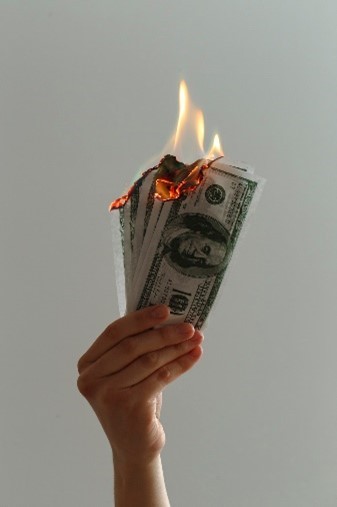
Qatar had a strategy to use the lead up to the World Cup to significantly increase its impact in international sports. They have subsequently hosted numerous prestigious sporting events over the past ten years and raised their profile internationally by investing in sports through sponsorship agreements, purchase of football clubs, acquisition of broadcasting rights, and the construction of cutting-edge sporting facilities.
Qatar have been accused of using sportswashing to rebrand their public image: the process of using major global sporting platforms to distract from the shadier elements of their regime, restricted women’s rights, criminalisation of the LGBTQ community and allegations of corruption. Leading up to the event, newspaper headlines were dominated by shocking stories of Qatar’s poor treatment of migrant workers.
Sportswashing is not a new practice, with examples dating as far back as the 1936 Berlin Olympic Games and more recently the Beijing Olympic Games. According to authors Brannagan and Giulianotti (2018) ‘state leaders may cut through the cacophony of the global information society to send a series of widely heard, reputation-enhancing messages over a sustained time" by hosting a mega-event like the World Cup’.
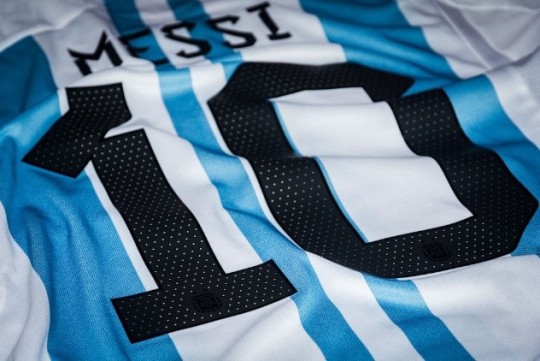
A recent Give Me Sport twitter thread reported how some fans are sensationally coming up with conspiracy theories that Argentina was rigged to win the World Cup! Such theories cite how, as one of the all-time greatest footballers, Lionel Messi will attract headlines for decades to come and is now inextricably linked to Qatar.
A feature of sportswashing is displacing undesirable internet search results with ones that are more relevant and abundant. Now when you click on Qatar, instead of human rights abuses you are more likely to see images from the Qatar World Cup. One of the most powerful images is the iconic photo of Messi lifting the trophy – which, incidentally, just happens to be the most liked post in history.
Media coverage throughout the tournament featured fans having a good time, walking the streets of Qatar, and enjoying the football – images that will be projected around the world, into people’s homes.
Rather that Qatar’s seedy underbelly, I will remember Qatar as a good World Cup, although it would have been even better if England had managed to bring it home! Qatar have certainly played a clever game, and I’m not talking about football.
N0938291
Here is a link to a questionnaire created to understand your opinions of Qatar securing the opportunity of hosting the World Cup. I want to know what you think, please share your thoughts.
Complete the survey
4 notes
·
View notes
Text
One could be forgiven for having a strange sense of deja vu for this year’s FIFA world cup. Australia’s group stage opponents, France and Denmark, were also in our group in 2018. The fourth and final member of the 2018 group C, Peru, was the last hurdle for the Socceroos to qualify for the 2022 edition, a game we eventually won on penalties, 5-4. Back then an own goal against France and a 2-0 defeat at the hands of Peru was enough to send us back home from Russia.
9 minutes into our first game of the 2022 FIFA world cup, like in 2018, against France, a country dared to dream, with Craig Goodwin scoring our first goal that was not a penalty at a FIFA world cup since Tim Cahill’s iconic left foot volley against the Netherlands in 2014. However, 18 minutes later France would equalise, and after that, it was all one-way traffic, as France ran out 4-1 winners, a margin 2 goals bigger than our encounter 4 years before.
4 hours earlier, a 0-0 draw between Tunisia and Denmark would prove pivotal in our hopes of progressing to the knockout stage.
For our second game of the tournament, against Tunisia, a second loss would surely see us go home, but 23 minutes in, Mitchell Duke scored and this would be enough to see Australia’s first win at a FIFA world cup since defeating Serbia 2-1 in 2010, but unlike that tournament in which Australia missed the knockout stage on goal difference, the Socceroos would still have one more game to play, but our defeat to France made missing on goal difference a very real chance yet again.
The equation would be simple, win and we go through to our first knockout stage since 2006, and the so-called golden generation, a draw would see us relying on a France team resting players to defeat Tunisia, something that would not occur, and a loss would see us losing out on spots in the knockout stage to France and Denmark yet again.
After a scoreless first half, anyone awake at 3am Sydney time would have surely been nervous, our fate was in our hands, and with the hero against the French, Craig Goodwin subbed off shortly after play recommenced, Australia was holding out for somebody, anybody, to put them in front, and with 30 minutes of play to go, their prayers would be answered, playing in his third world cup Matthew Leckie would score his first goal in the tournament with Australia holding onto this lead for the half hour that remained, qualifying for the knockout stage for the first time in 16 years.
But what about The first golden generation, how did they fair? After a come-from-behind win of 3-1 against Japan, and a 2-0 loss to Brazil, a 2-2 draw to Croatia would be enough to see us qualify on 4 points for the knockout phase. But Australia’s 2 wins in the 2022 edition would see us make it with 6 points. As manager Graham Arnold said “I’ve been listening and hearing about that golden generation of 2006. They got 4 points and now we’ve got 6.” Suggesting that his team should go down in history as better than that team, and who am I to argue.
Next on Australia’s radar is Argentina, a team we last played in 2007, and have only defeated once in 7 matches, back in 1988. A team that also boasts one of, if not the best player of this generation Lionel Messi. There’s always a chance that we get past the round of 16 teams, but a scoreline similar to that of a game against France would not be out of the question.
3 notes
·
View notes
Text
The Best World Cup Final in History?
A recap of arguably the most intense World Cup Final of all-time
By Joshua Crisologo
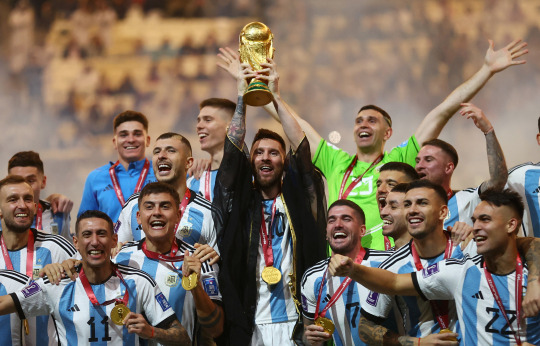
Lionel Messi heading Argentina’s victory at the 2022 World Cup
Photo via Reuters
On December 18, the 2022 FIFA World Cup came to a close; displaying a final that will be cemented as one of the best football matches in history.
The World Cup Trophy was hoisted by Argentina, who defeated the previous champions, France, in a match for the ages. The final score was 3-3 after extra time, with Argentina winning 4-2 on penalties.
Lionel Messi, one of the greatest football players of all time, scored the first goal of the match through a penalty in the 23rd minute. As celebration erupted, Argentina increased their lead through Ángel Di María’s goal in the 36th minute. Argentine jubilation filled the stadium that held 88,966 fans as halftime approached. The score was 2-0.
Fans of France had their hopes of a title slowly slip away until the French were given a penalty. Kylian Mbappé scored the penalty in the 80th minute with poise as the chances of a French comeback rose. Just under two minutes later, Mbappé added the equalizer for France off of an amazing volley, tying the score at 2. France was back in the game. Since the score was still tied at the end of regular time - the 90th minute - the match moved into extra time, which consisted of two 15 minute halves.
In the first half of extra time, Messi showcased his magic as he rebounded the ball into the goal in the 109th minute, making the score 3-2. Yet France bounced back once again as Mbappé scored his third goal of the match through another penalty in the 118th minute, earning himself the first hat trick (scoring three goals in the same match) in the World Cup finals since 1966. The score stayed 3-3 until the end of extra time, which meant that a penalty shootout would decide the winner. Argentina came out as the victor in penalties, as Gonzalo Montiel scored the winning penalty.
Argentina was awarded the World Cup Trophy as the awards ceremony proceeded. The FIFA Young Player Award, awarded to the best player who is at most 21 years old, went to Argentina’s Enzo Fernández. The Golden Glove, awarded to the best goalkeeper, went to Argentina’s Emiliano Martínez, who made an amazing save in the finals near the end of extra time. The Golden Boot, awarded to the player who scored the most goals, was given to Mbappé, who scored 8 goals throughout the tournament. Lastly, the Golden Ball, which is given to the best overall player in the World Cup, was awarded to none other than Messi himself.
Mbappé, despite losing the World Cup, has only just turned 24. Already having earned a World Cup trophy back in 2018, the French superstar has a long and bright path ahead of him. On the other hand, the World Cup trophy is the latest piece added to Messi’s arsenal of awards - one of the only pieces he was missing. As Messi approaches retirement, it would be a shame if he wasn’t able to become a world champion. With the World Cup and another Golden Ball in his hands, Messi has only fortified his status as one of the Greatest of All Time.
6 notes
·
View notes
Text
“Women can be up to six times more likely to suffer ACL injuries than their male counterparts taking part in the same sports.”
Beth Mead has called on football’s authorities to launch a detailed investigation into why so many top female players have suffered anterior cruciate ligament injuries — and said that such research would already be in progress had male stars been affected to the same degree.
Mead, the 27-year-old Arsenal forward, won the BBC Sports Personality of the Year (Spoty) award for her goals which led England to glory at the European Championship this summer. However she is facing a long spell out of the game after rupturing an ACL last month during a match against Manchester United, and says she wants to use her recovery time to take part in a research project. She has concerns that the packed schedule could be a factor.
Her partner and Arsenal team-mate, Viviane Miedema, suffered exactly the same injury last week during a Champions League game against Lyon, making it ten senior Women’s Super League players sidelined with ACL problems among the 12 teams.
Five of the top 16 players on the 2022 Ballon d’Or women’s award shortlist have torn an ACL — the winner Alexia Putellas, Catarina Macario and Marie-Antoinette Katoto, plus Mead and Miedema. In fact, all three winners since the women’s award was launched in 2018 have had an ACL injury at some point, with Ada Hegerberg and Megan Rapinoe also sidelined for long spells. All in all, it is estimated that women can be up to six times more likely to suffer ACL injuries than their male counterparts taking part in the same sports.
Sarina Wiegman, the England women’s head coach, has backed Mead’s call for a detailed study, saying that men’s and women’s physiology is different, and has called on Fifa and Uefa to get involved.
Mead, who has not given up hope of recovering in time for the World Cup next summer, said: “Look at the top Ballon d’Or players who have done it. I see myself as quite a robust player but this has still happened. You look at Viv, she’s quite a robust player and we’ve not been players generally hit with injuries so I do think we need to look into it a lot more.
“I think if that happened with [Lionel] Messi, [Cristiano] Ronaldo, [Antonine] Griezmann there’s probably going to be a lot more done when those things happen.
“It’s something that needs to be looked into, and something I would like to push forward. Me and Viv would really like to get involved and put it out there a little bit, hopefully we can look into some stuff and it would be a positive use of our time.
“There doesn’t seem to be a lot going on. Unfortunately this has happened to us but hopefully it can kick somebody up the arse to go on and start doing something.”
Mead believes the demands being placed upon modern players could be contributing to the issue. “The scheduling could be a lot better,” she said. “We won the Euros and a couple of weeks later we are back into camp again, not really any time to switch off. We do it because it’s our job and we love what we do but at the same time we need to look after players a lot better.
“It could be a combination of all of it. You can say us after the Euros, we had a lot going on as well in our lives — it’s a change.”
Miedema, the Holland forward, has written off her chances of making the World Cup, which takes place in Australia and New Zealand in July and August, but Mead, who was the top scorer (with six goals) and player of the tournament at the Euros, is refusing to do so.
“I’m two weeks post-op now and I’m in a really good position,” she said. “It’s difficult to put a timestamp on it with this injury because you can wake up one morning and it’s stiff and you can’t do anything and another morning you feel you could run on the pitch.
“I’m going to take it each day as it comes, that’s what mum has always told me. I will work my hardest and I will work my arse off in that gym to get myself in the best possible position for next year.”
Wiegman, who won the Coach of the Year award at Spoty, also called for a reform of the schedule.
“The FA is investigating it. The top, top-level players will have five consecutive tournaments in a row,” she said. “The demands of the game on the top players are getting higher and higher. They need a break too, they need some rest. We have to find a way because now we get too many injuries.
“We also have to look at who has got an ACL — what’s her programme? What does it look like? Get the bigger picture so you get the right things out of this research. Fifa, Uefa and the federations have to do something about this.
“There hasn’t been that much research about women’s football. Women are built differently to men; the hips and the knees are different, the angles are different. There’s lots of research in the men’s game, not the women’s game.”
The FA said its monitoring programme has shown ACL injuries represent 1.3 per cent of the total number of injuries in the top two tiers of women’s football in England, with hamstring injuries the most common at 11 per cent.
A spokesman said: “We will continue with our injury and illness surveillance work, which will continue to give us important medical insight into women’s football.”
Q&A: How women are more vulnerable to devastating injury
By Molly Hudson
What is an ACL?
An ACL is the anterior cruciate ligament in the knee. It is a tough band of tissue joining the thigh bone to the shin bone at the knee joint. It runs diagonally through the inside of the knee and gives the knee joint stability. Damage to it often results in surgery.
What is the prognosis?
The most common injury to an ACL is a tear or rupture. This requires surgery and can rule out an athlete for up to a year. Elite athletes can have surgery once the swelling has gone down through private medical teams. Waiting lists on the NHS for a grassroots player with a ruptured ACL can be several months and even years.
Are there differences between men’s and women’s ACLs?
While research is reasonably scant, as Beth Mead has highlighted, it is thought the biological differences between men and women make females more likely to rupture their ACL. This is because women’s hips are wider, so the angle in which their knee plants in the ground is different. Women tend to have less muscle mass in the knee which means it is more likely to overstretch, while the early stages of the menstrual cycle can also make ligaments laxer, and therefore more vulnerable to rupture.
Women can be up to six times more likely to suffer ACL injuries than their male counterparts taking part in the same sports. Football is a particularly high-risk sport given the sudden twists and turns of the knee joint. Many ACL injuries occur without contact with an opponent.
How can it be prevented?
Prevention is the key — there is no medical “cure” as such, but prehabilitation is used by all the top clubs. This can vary from monitoring players’ menstrual cycles to potentially lowering the intensity of training when they are most vulnerable, to strength and conditioning work around the muscles in the knee and the glutes. In recent months, player load — the amount of games and high-intensity work — has been highlighted as another concern.
If we know this, why do we need more research?
As with many areas of women’s sport, the research conducted is small-scale and limited. Female players are taking part in an unprecedented number of games at present, requiring a physical output higher than ever as the standard rises and the game becomes more professional. We simply do not know the affect this has on ACL’s and other injuries in women.
5 notes
·
View notes
Text

Image credit: Instagram
Lionel Messi and wife Antonela Roccuzzo paint it red
The Lionel Messi-led Argentina emerged as the winner of FIFA World Cup Final 2022 after defeating the defending champions France by 4-2 in a dramatic penalty shoot-out. Emotional pictures of Messi and his wife Antonela Roccuzzo have become the most liked pictures on social media. So without much ado, we take a look at some of Messi and Antonela's loved-up pictures from their beach vacation that are nothing but romantic couple goals.
Facebook share
Twitter share

Image credit: Instagram
The fitness freaks
Both Lionel Messi and wife Antonela Roccuzzo are fitness freaks and their ripped bodies just prove how much they pay attention to their overall health. Also Read - BTS: Jungkook and FIFA World Cup 2022 winner Argentina's player Angel Di Maria have THIS in common
ALSO WATCH
FIFA 2022: After Nora Fatehi Deepika Padukone to unveil World Cup trophy during the finale in Qatar [Watch Video]
FIFA World Cup 2022: Ranbir Kapoor, Hrithik Roshan and more celebs obsessed with FOOTBALL [Watch Video]
Today's Top News in Entertainment: Dwayne Black Adam will not be part of DC's first chapter, Shah Rukh Khan on Empire’s 50 greatest actors [Watch Video]
Kartik Aaryan speaks on why he will never get trapped in doing masala films [Exclusive]
Christmas 2022: Spirited, Klaus, The Guardians of the Galaxy: Holiday Special; list of best movies to watch this holiday season [Watch Video]
Kantara, KGF 2, RRR, complete list of Best To Worst South Indian Movies of 2022 [Watch Video]
Facebook share
Twitter share
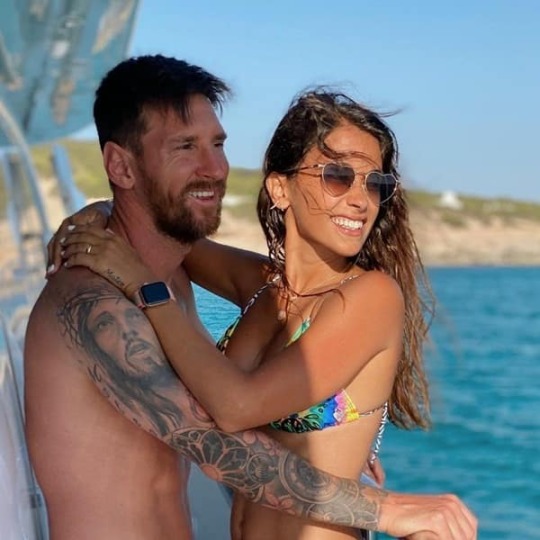
Image credit: Instagram
Into the arms
Lionel Messi and wife Antonela Roccuzzo can be seen embracing each other into the arms while enjoying their beach vacation.
Facebook share
Twitter share
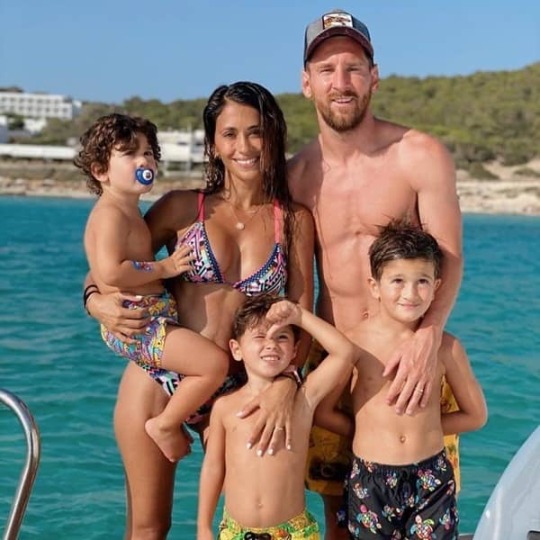
Image credit: Instagram
A happy family
Lionel Messi and wife Antonela Roccuzzo have three sons, Thiago - born in 2012, Mateo -born in 2015 and Ciro - born in 2018. Also Read - FIFA World Cup 2022 final: Argentina beats France on penalties; Shah Rukh Khan, Ranveer Singh and more Bollywood celebs can't keep calm [View Tweets]
Facebook share
Twitter share

Image credit: Instagram
Over a decade of togetherness
Lionel Messi and Antonela Roccuzzo have been together since 2008. They have been childhood sweethearts. They got married on 2017.
Facebook share
Twitter share

Image credit: Instagram
Hotness personified
Both Lionel Messi and Antonela Roccuzzo are hotness personified and their beach vacation pictures scream love and care for each other. Also Read - FIFA WC 2022: Ananya Panday lives her fangirl moment with David Beckham and it's too cute
Facebook share
Twitter share
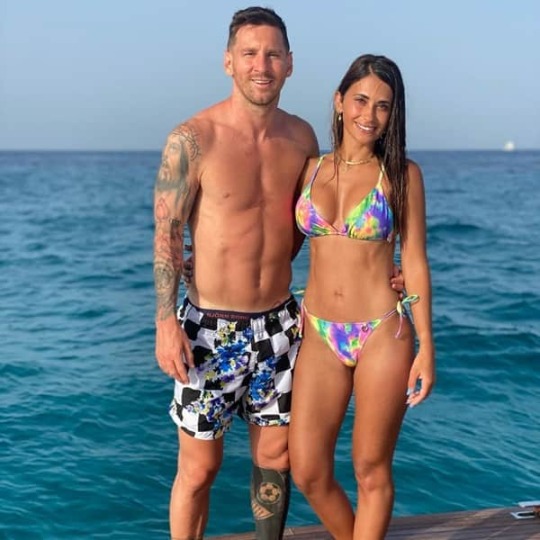
Image credit: Instagram
Made for each other
From hailing from the same hometown to becoming the thickest of friends then moving to Spain to stay together and culminating their long relationship into marriage, Lionel Messi and Antonela Roccuzzo's love story is no less than a romantic movie. They are made for each other.
2 notes
·
View notes
Text
Serbia and Switzerland face off tonight in the final round of group fixtures at the 2022 World Cup in what has become one of the great geopolitical grudge matches in international soccer. The two sides met at the same stage of the last tournament in Russia four years ago, and tempers boiled over after Switzerland’s Kosovo-born winger, Xherdan Shaqiri, scored a last-minute winner that eliminated Serbia from the competition and secured Switzerland’s progression to the next round.
Before Shaqiri’s strike, the score sat level at 1-1 after Granit Xhaka, another Swiss player of Kosovar-Albanian heritage, canceled out Serbia’s early opener. As Shaqiri reeled away, he celebrated his goal by forming a two-headed eagle gesture with his hands—just as Xhaka did earlier in the match—in tribute to the Albanian flag. Serbia’s players erupted with rage, and a melee ensued, triggering endless controversy and several FIFA investigations into player misconduct.
It is often said that sports are politics by other means, and this World Cup hasn’t been short of geopolitical subtexts. From the United States’ game against Iran, to the Iran team’s refusal to sing their own national anthem as an alleged silent protest against the oppression of protesters back home, to Qatari “sportswashing,” there has hardly been a more political World Cup in history—barring perhaps Argentina 1978, which was controversially held in a military dictatorship at a time when ordinary citizens were being disappeared and murdered by the state.
The fault lines behind the Serbia-Switzerland fixture, as was the case four years ago, center on Belgrade’s continued refusal to accept Kosovo’s independence after its unilateral secession from Serbia 14 years ago.
Since the previous meeting between these two sides in Kaliningrad, the diplomatic standoff between Serbia and Kosovo has barely progressed, while the enduring ethnic animosities between the two sides have already reemerged in Qatar, which promises to turn tonight’s match into a powder keg.
This reflects the political situation on the ground in Kosovo, where fears of renewed interethnic violence were running high in recent weeks after the government pushed on with plans to coerce drivers into surrendering their Belgrade-issued license plates; a recent deal has defused tensions for the time being. Serbia-Kosovo relations appear to be unsolvable. But that’s because relations are treated solely as a political issue, rather than an emotional one deeply rooted in the Balkan character.
Ahead of their opening game against Brazil, the Serbian team decided to hang a banner bearing an image of Kosovo overlaid with the Serbian flag and the words “No Surrender.” This is a common nationalist symbol that can be spotted at soccer matches and far-right protests in Serbia. Danilo Vucic, the son of Serbian President Aleksandar Vucic, was spotted wearing a No Surrender T-shirt at the original fixture in 2018.
FIFA promptly announced an investigation into Serbia’s “hateful” flag, which is likely to lead to a fine for the Football Association of Serbia. Not that this will change anything. Because in soccer, as in politics, the spiteful joy that comes from seeing the opponent lose often outweighs the benefits of winning. This is why the Serbia-Kosovo dispute has proved so intractable.
For a brief moment in 2020, Vucic and his counterpart in Pristina, Hashim Thaci, appeared ready to strike a deal. There were rumors that former U.S. President Donald Trump’s special envoy to the Balkans, Richard Grenell, was prepared to greenlight a controversial land swap proposal that would redraw the maps of the two countries along ethnic lines by exchanging a Serb-majority portion of northern Kosovo for an Albanian-majority slice of southern Serbia.
This was the first time that Belgrade had shown any genuine willingness to engage with a proposed resolution. But the European Union moved quickly to torpedo the deal because Brussels feared that it could trigger other ethnically driven border disputes across the Balkans. The Specialist Prosecutor’s Office in The Hague announced that it had filed a 10-count indictment with the Kosovo Specialist Chambers charging Thaci, a former guerilla leader, with war crimes and crimes against humanity allegedly committed during the Kosovo War. Thaci resigned and Grenell’s mandate was cut short by Trump’s 2020 election defeat, which killed off the land swap proposal for good.
In 2021, the Vetevendosje party and its leader, the nationalist firebrand Albin Kurti, won a commanding mandate in Pristina following snap elections. Kurti has taken an uncompromising line against Belgrade and is insistent that he will settle for nothing less than full recognition of Kosovo’s independence. Although this sounds like a reasonable demand on paper, in practice it is close to a political impossibility.
Even if Vucic did choose to defy majority opinion in Serbia and sacrifice his own career for the ideal of regional reconciliation, the Serbian constitution codifies Kosovo’s status as “an integral part of the territory of Serbia,” which means that recognition would be unconstitutional and thereby illegal.
This leaves Vucic with two options: to alter the constitution, which would require a national referendum that would be doomed to fail, or to impose it undemocratically upon the nation without a vote and hope that his government isn’t overthrown by mass protests. It is highly unlikely that Kurti isn’t aware of this, which is why it could be said that he doesn’t approach the negotiations in good faith. Kurti would argue that there can be no compromise on justice, but that doesn’t make his position any more diplomatic than Serbia’s.
Indeed, throughout his term, Kosovo’s prime minister has shown that he isn’t afraid of provoking Belgrade or angering Brussels in the pursuit of his political aims.
Tensions reached a new peak this November, when Kurti insisted that he would press on with plans to begin issuing fines to drivers if they don’t exchange their Belgrade-issued car license plates for ones issued by the Republic of Kosovo. Many ethnic Serbs in the country have continually refused to comply with this regulation, and there were heightened fears that the measures, which allow the police to confiscate the vehicles of repeat offenders, could lead to further outbreaks of interethnic violence after Serbs barricaded roads and fired live ammunition in protests that occurred over the summer.
The standoff lasted for weeks, and while a diplomatic fix was eventually found after Serbia agreed to stop issuing new license plates to drivers in Kosovo if Pristina backed down, Kurti was publicly criticized by EU foreign-policy chief Josep Borrell during a temporary breakdown in negotiations as the main barrier to progress—a charge that has usually been directed toward the Serb side in the past. By the end of November, a diplomatic fix deescalated the issue for the time being, but Kurti’s zeal appears to be alienating friends and damaging his country’s international standing.
The continued failure to normalize relations between the two sides stems from the fact that international negotiators continually treat it as an equation that can be solved by the right combination of diplomacy and policy. But Serbia’s position can only be understood if it is viewed as a matter of political psychology.
Since the beginning, Brussels has tried to incentivize Belgrade to recognize Kosovo’s independence in exchange for political and economic benefits such as EU membership. But polling shows that a vast majority of Serbian voters would reject this trade-off if it was put to a vote. Serbia’s obstructionism is often misconstrued as a negotiating tactic when it is actually a political end in and of itself.
Vucic has already made it clear to the West what Serbia needs from any future deal, yet international actors have chosen to ignore him. In a 2017 interview, the Serbian president told the Swiss newspaper Blick, “Unless both sides are willing to lose something, then the [Serbia-Kosovo] conflict will go on forever.” His words should be taken at face value.
In Serbia, there is an emotional impulse called inat that is widely accepted as a key feature of the national character. It is difficult to offer a direct translation of inat, but “spiteful contrarianism” comes close. The English expression about cutting off your nose to spite your face captures the spirit of the term.
A Serbian idiom that helps illustrate inat is the phrase “so long as the neighbor’s cow dies.” What this refers to is a common stereotype in Serbia that people take pleasure in watching others’ misfortune because it makes their own struggles easier to bear. Seeing the neighbor prosper, by contrast, can only be a source of frustration. While similar to schadenfreude in some ways, inat has an element of counterproductive rebellion; it’s an emotional reflex rather than a logical, considered reaction—and it’s malicious by design. This dynamic is a key feature of the dispute with Kosovo.
Serbia may no longer have any control over the breakaway province, but it does have the power to stunt its development as an independent state by blocking its entry into international institutions and waging a derecognition campaign that diminishes the legitimacy of its claims to statehood.
A resolution would require Serbia to relinquish this power, which means that the onus is on Pristina to make concessions if it wants to see changes to the status quo. And, as Vucic has already highlighted, the only deal that he can sell back home is one that is begrudgingly accepted by Kosovo without celebration. The opponent cannot be allowed to feel like they have won. This is inat in geopolitical form.
This same dynamic can be seen in tonight’s World Cup match. After being so comprehensively humiliated by Xhaka and Shaqiri in 2018, Serbia’s players and fans want revenge both on and off the field. The team knows that this is certain to motivate the opposition, but it also means that, if they do win, defeat will feel so much more painful for their adversaries.
But this isn’t just a Serbian quality: It’s a fundamental component of soccer fandom. Many of the sport’s biggest rivalries are disputes over petty differences between neighbors, where the joy of watching your team win is outweighed by the tribalistic pleasure of seeing your opponent lose. Ultimately, soccer is just inat by other means.
4 notes
·
View notes
Text
Japan's Comeback Victory Secures R16 Spot; Morocco Atop of Group F
A Recap of Groups E & F of the 2022 FIFA World Cup
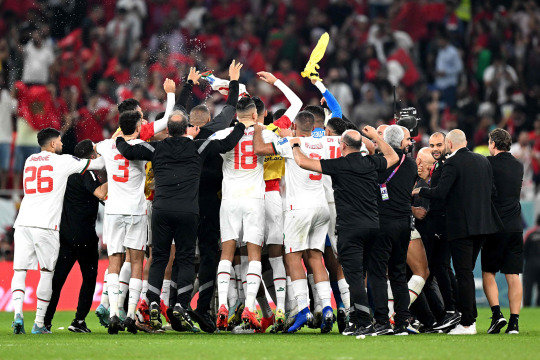
Morocco celebrates as they advance to the Round of 16 of the FIFA World Cup, eventually as the group champion (📸 AFP via Daily Sabah)
The writing started right before the start of the last two groups (Group G & H), hence it did not reflect the latest changes.
Yesterday saw several countries "unexpectedly" advancing to the Round of 16. In Group E, where Morocco advanced for the second time in 36 years, while Japan became the winner of the group after scoring a comeback win against Spain 2-1.
The evening started with the third match of Group F, between Belgium v. Croatia and Morocco v. Canada, held simultaneously. Morocco started aggressively in the first half by a goal from Hakim Ziyech in 4', taking an advantage from Canada's unguarded pitch. Subsequently, Canada started to get the groove with their chances, but it went too wide.
The Moroccan perfection continued with an additional goal from Youssef En-Nesyri at 23', where he executed the pass straight away that came from Achraf Hakimi. Meanwhile, in an attempt of the Canadian struck back, the Atlas Lions conceded to their own Nayef Aguerd, defending erratically the strike from Sam Adekugbe, enabling Canada to catch up at 1-2. On the other hand, both Croatia and Belgium defended well, somewhat unable to strike an on-target goal chance, hence the 0-0 scoreline until the whistle blew in half time.
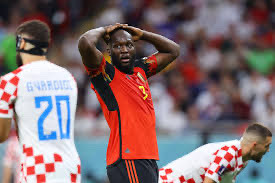
Romelu Lukaku's reaction to one of his missed chances in the second half (📸 Getty Images via The Times)
The flow on the second half, however, switched. There were several brilliant on-target chances, most notably from Romelu Lukaku, where one of it reached the goal post near the end of the match. Furthermore, Croatia also recorded its notable chances from Mateo Kovacic, for example, but to no avail. On the other hand, Canada continued their counter-attack while Morocco defended well; however, they held on for the 2-1 victory for Morocco, enabling them to advance to the Round of 16 as a group winner.
At the end of the day, the final standings of Group F looked as follows:
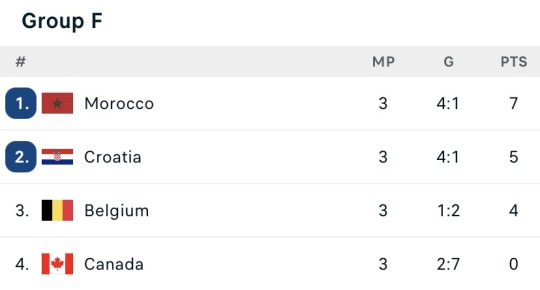
The final standings of Group F (📸 FlashScore)
While having the same goal difference and scored equal number of goals, Morocco topped the Group F standings from their victory against Canada. However, the draw was not enough for Belgium to pass Croatia, where it was sufficient for the latter to secure their qualification as the group's runner-up.
This match also marked Roberto Martinez's emotional last match as the Belgian head coach. He led the Belgian "Golden Generation" to the third place of the 2018 FIFA World Cup, as well as being in the top of the FIFA rankings for up to three years. The decision was made right before the World Cup, where in the post-match interview he also concluded that their performance was not decent enough at this level, while Croatia managed to equal their level at that match.
Group E's Scramble to R16

The standings dynamic of Group E throughout the course of both matches (📸 #APORLA15 on Twitter).
The evening ended dramatically with the dynamicity of Group E's standings during the 90 minutes of both simultaneous matches. Every goal scored shook every psrt of the standings, considering how the teams tried to be more aggressive as possible, hence both matches being fast-paced.
Germany started the scramble by Serge Gnabry's goal at 4' in an excellent execution of the previous passes, putting them in the third place of the standings. Several minutes later, Spain's Alvaro Morata perfectly put the ball to the net at 10', strengthening the Spanish lead in the standings.
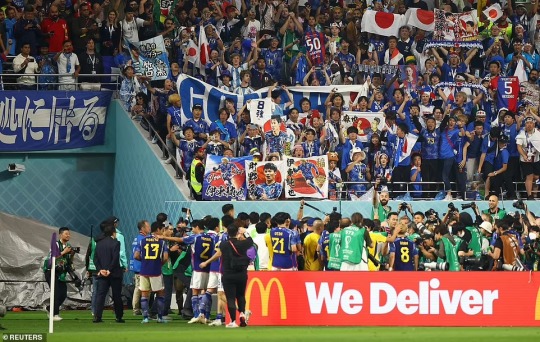
The Japanese players celebrated with the fans after their win against Spain (📸 Reuters via Daily Mail)
The scramble then continued in the second half, where Ritsu Doan scored a goal right 3 minutes right after the start, thanks to his 18-yard accurate shot. Several minutes later, they tried to apply more pressure to the Spanish side from Kaora Mitoma’s passing cut from Ao Tanaka, which goal afterward deemed controversial because of the pass being several millimeters close to offside, while the goal itself needed 2 minutes to be deemed valid by the Virtual Assistant Referee (VAR) confirmation. Had the ball been out, Germany would have stood second in the standings, increasing their likelihood to advance to the final.
While both Japan and Spain held on throughout the last few minutes, Germany and Costa Rica competed to outpace each other: Yeltsin Tejeda scored after the rebound at 58’, then they led 2-1 after Juan Pablo Vargas scored to follow the free kick up, and Germany equalized after Kai Havertz scored from inside the box. However, while Japan and Spain stayed stagnant, Germany and Costa Rica produced excellent chances, which mostly maximized in the German side, including Havertz’s goal from the back post and Leroy Sane’s assisting position given onside before Niclas Füllkrug executed the goal. This goal party was the main reason behind the constant position changes in the standings.
As it stood by the final whistle, the final standings of Group E was set:
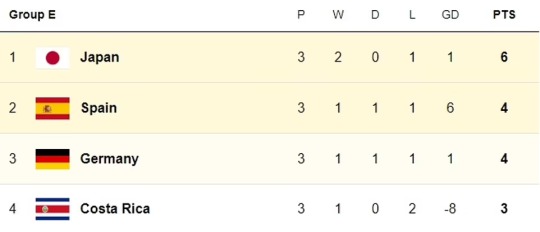
The final standings of Group E (📸 Daily Mail)
With the last two groups remaining by the start of this writing, this means the three-fourth of the Round of 16 matches were set. As the group winner, Japan will face Croatia, while Spain will face Morocco from the previous groups’ standings. Germany, however, was eliminated due to the goal difference tie-breaker, thanks to the Spanish 7-0 victory against Costa Rica, with Costa Rica being the last place.
Incoming will be the recap from the last two groups, with the last group ongoing by the time this writing was finished.
#fifa world cup 2022#fifa world cup#world cup qatar 2022#football news#football updates#group stage#world cup#knock out stage#qatar 2022
2 notes
·
View notes
Text
Portugal FIFA World Cup: Portugal FIFA World Cup 2026 Squad Roberto Martinez's Full Team
Portugal FIFA World Cup: The Portugal FIFA World Cup 2026 squad kicked off their campaign with a victory on the opening day, setting a strong foundation as they aim for glory this summer. The 2016 Euro champions are among the favourites at this World Cup, owing to their stellar qualification run and the wealth of talent at their disposal, with Cristiano Ronaldo eager to make a significant impact.
Acquisition your FIFA World Cup tickets from E-ticketing.co, your trusted online marketplace. We offer exclusive access to Portugal's FIFA World Cup tickets ensuring a reliable booking experience for the 2026 Football World Cup. Sign up for alerts to stay updated on the latest ticket availability and secure your spot at the next World Cup.
A last-minute winner against the Czech Republic in their first match certainly helped—though it was substituting Francisco Conceicao who netted the decisive goal, not their captain Ronaldo. Cristiano Ronaldo, at 39 years old, is astonishingly not the oldest outfield player, with veteran defender Pepe now 41. This squad features significant experience and quality with players such as Bruno Fernandes, Bernardo Silva, Joao Felix, Rafael Leao, Ruben Dias, and Ruben Neves.
Cristiano Ronaldo is set to play in his 11th major international tournament, having been named in the Portugal squad for the FIFA World Cup 2026. The 39-year-old Al-Nassr forward is the most capped male player in international football history, with 206 appearances and 128 goals for Portugal. Roberto Martinez included Ronaldo among the seven forwards in his 26-man squad for the upcoming tournament.
Martinez highlighted Ronaldo's ongoing value, stating that he offers "a quality in front of goal which we greatly appreciate and need." Ronaldo made his major tournament debut at Euro 2004 when Portugal reached the final on home soil but lost to Greece. The five-time Ballon d'Or winner helped Portugal secure the Euro 2016 title, his only major international silverware, and the Nations League in 2018-19.
Football World Cup Tickets: Ronaldo Named in Portugal Squad for FIFA World Cup 2026
Cristiano Ronaldo is set to participate in his 11th major international tournament. Having been named in the Portugal squad for the FIFA World Cup 2026. The 39-year-old Al-Nassr forward is the most capped male player in international football history. With 206 appearances and 128 goals for Portugal.
We offer FIFA World Cup 2026 tickets to enthusiasts through our trusted online platform, e-ticketing.co. Secure your highly anticipated Football World Cup tickets with us, your most reliable source for booking and updates.
Portugal manager Roberto Martinez included Ronaldo as one of seven forward players in his 26-man squad for the upcoming tournament. At a news conference, Martinez highlighted Ronaldo's enduring value. Stating that he offers "a quality in front of goal which we greatly appreciate and need."
Ronaldo made his tournament debut at Euro 2004 when Portugal reached the final on home soil but lost to Greece. The five-time Ballon d'Or winner helped Portugal secure their only major. International silverware by winning Euro 2016 and the Nations League in 2018-19. Nine players from Premier League clubs are in Martinez's squad.
Wolves trio Jose Sa, Nelson Semedo, and Pedro Neto all cut. The squad also includes Manchester United's Bruno Fernandes and Diogo Dalot. Manchester City's Bernardo Silva and Ruben Dias, Fulham's Joao Palhinha, and Liverpool's Diogo Jota. Martinez also selected veteran defender Pepe, 41, along with his 21-year-old Porto teammate Francisco Conceicao.
Winger Conceicao, the son of former Portugal international Sergio Conceicao, earned his first senior international cap against Slovenia in March. Portugal's Group F opener is against the Czech Republic on June 18, followed by fixtures against Turkey and Georgia. The team will be looking to build on their strong start and capitalize on the mix of seasoned veterans.
Portugal Faces Cristiano Ronaldo Conundrum After Win Over Czech Republic
At the final whistle, Cristiano Ronaldo celebrated wildly with match-winner Francisco Conceicao. And who could blame him? The 21-year-old had come on and scored the 92nd-minute goal to finally earn. The points for Portugal, ripping off his shirt and roaring in delight.
Football fans around the globe are eagerly awaiting the FIFA World Cup 2026. To experience the excitement firsthand, fans can secure their FIFA World Cup tickets via our online platform, e-ticketing.co. Don't miss your chance to be part of one of football's most thrilling tournaments.
In what is becoming a theme of this World Cup, it was another crucial goal struck by a young player. It was also Conceicao’s first goal in his first competitive appearance. Scored with his first touch just 111 seconds after he was introduced.
The cameras and attention, though, were on Ronaldo. But then, they are always on Ronaldo. Even so, that celebration surely also came with a pang of relief. Had Portugal not won, the questions would have begun as to whether Ronaldo is now actually. A help or a hindrance to this richly talented Portugal side.
Instead, coach Roberto Martinez was able to purr about the comeback and the collective effort. “We showed heart and we played with discipline,” he said of one of the tournament’s favourites. He would not have gotten away with that if Portugal had not won. Especially with striker Goncalo Ramos staying on the bench as Ronaldo proved wasteful.
The 39-year-old Ronaldo remains a focal point for Portugal. But this match highlighted the emerging talent that could define the team's future. Conceicao's dramatic impact in his brief appearance suggests a bright future, but it also raises questions about. The balance between relying on veteran stars like Ronaldo and integrating fresh, dynamic talent.
Revelling Legends and Uniting Fans Across Continents in FIFA 2026
In a brilliant move that resonated deeply with fans across India. The official Portugal FIFA World Cup Instagram account generated excitement. With a post linking cricket legend MS Dhoni to football star Cristiano Ronaldo. This post was shared just before Ronaldo commenced his Euro 2024 campaign. Portugal highlighted the shared significance of their iconic jersey number.
Football enthusiasts around the globe are eagerly awaiting FIFA World Cup tickets. To experience the excitement firsthand, secure your FIFA World Cup Final Tickets through our online platform, eticketing.co. Don't miss out on the chance to be part of one of football's most thrilling tournaments.
FIFA's choice to caption Ronaldo's photo with "Thala for a reason" was a masterstroke. This phrase, deeply cherished by Indian sports fans, instantly sparked enthusiasm across social media platforms. By connecting Dhoni's revered legacy with Ronaldo's global stardom, FIFA created a bond that transcended borders.
The move not only celebrated two iconic athletes but also showcased the power of sports in bringing diverse communities together. It highlighted how a simple gesture could bridge the gap between cricket and football. Fostering a sense of unity among fans from different sporting backgrounds.
As Ronaldo continues his journey in the FIFA World Cup 2026, the connection to Dhoni serves. As a reminder of the universal language of sports and its ability to unite people across continents. This innovative social media strategy by FIFA has set a precedent for how sports organizations can engage with global audiences.
For fans eager to attend FIFA 2026 matches, a wide selection of FIFA World Cup 2026 tickets awaits at Eticketing.co. Our platform collaborates exclusively with the most reputable sellers on the secondary market. Ensuring access to top-quality ticket listings from across the web. Explore our Football World Cup selection to discover the most affordable deals available today!
0 notes
Text
Al Ain: 2024 AFC Champions League Winners

Al Ain: Doubles from Soufiane Rahimi and Kodjo Laba drove United Arab Emirates’ Al Ain FC to win the AFC Champions League™ 2023/24 title following a 5-1 victory over Japan’s Yokohama F. Marinos in the second leg of the final at Hazza bin Zayed Stadium on Saturday.
The J1 League side had won the first leg 2-1 in Yokohama, but a scintillating second-half performance from Al Ain meant the inaugural winners of the AFC Champions League in 2002-03 become also the last team to win it under the current format before the launch of the AFC Champions League Elite next year.
Following their continental triumph, Al Ain become Asia’s fourth representatives at the FIFA Club World Cup 2025, joining Saudi Arabia’s Al Hilal SFC, Japan’s Urawa Red Diamonds and Korea Republic’s Ulsan HD at the US tournament next year.
Already holding a one-goal advantage from the home tie two weeks earlier, the Japanese side came racing out of the blocks trying to add another that could ease the task in front of a packed Hazza bin Zayed Stadium.
Anderson Lopes tested goalkeeper Khaled Eisa within two minutes, but his shot from a tight angle was saved by the UAE international.
With seven knockout stage goals to his name already, the Moroccan showed his quality once again, picking the ball up on the left flank, cutting inside and feinting a shot but instead intelligently finding Yahia Nader who produced a moment of genius, sending a backheel pass that left goalkeeper William Popp in no man’s land and allowing Rahimi to slot home into the empty net for the opener.
Rahimi’s pace continued to be a nuisance for the Marinos defence; the Moroccan was too quick for Shinnosuke Hatanaka, beating the Japanese centre-back to the ball and forcing him to commit a foul inside the box, which translated into a penalty kick following a VAR check. Paraguayan playmaker Alejandro Romero (Kaku) stepped up and slotted home his side’s second.
Al Ain continued to rely on counter attacks and could have been 3-0 on the night seven minutes before the break when Rahimi pushed forward down the wing, beating his markers, but with just the goalkeeper to beat from a narrow angle, the winger’s left-footed finish hit the side netting instead.
The visitors equalised the aggregate score in the 40th minute, as Yan Matheus capitalised on a mistake from Kouame Kouadio to snatch the ball, cut into his left foot and aimed for the bottom far corner where Eisa’s fingertips were unable to stop it nestling into the back of the net to make it 2-1 on the night.
There was still room for more drama before the break as Marinos were reduced to 10 men following a red card to goalkeeper Popp.
Once more it was Rahimi causing trouble; he broke free down the middle at full speed, rounding the goalkeeper who made contact to bring him just outside the penalty box, receiving his marching orders in the process.
Al Ain piled up the pressure after the restart, with head coach Hernan Crespo introducing striker Laba for full-back Saeed Jumaa.
The hosts were rewarded for their attacking endeavors with a third goal midway through the second half, and once more it was Rahimi delivering the goods, while it was Laba who was the focal point of the attack, starting the move which saw defender Eduardo clear the ball, but only as far as Rahimi who controlled it expertly, moving it to his left foot and hammering home for Al Ain’s third.
It was the 27-year-old’s 13th goal of the campaign, matching the record for most goals in a single AFC Champions League season, shared by Guangzhou FC’s Muriqui (2013), FC Seoul’s Adriano (2016) and Al Sadd’s Baghdad Bounedjah (2018).
With 10 minutes of added time given, substitute Laba cemented the win with a fourth goal. Goalkeeper Fuma Shirasaka, who himself had come in the place of Elber following the dismissal of Popp in the first half, committed a horror mistake, missing his attempt to clear Rahimi’s through pass, allowing the Togolese forward to finish comfortably into the empty net for his seventh goal of the campaign, having last scored in the round of 16.
Deep into added time, Laba added his second of the night and his team’s fifth. The 32-year-old fed Kaku down the left and the Paraguayan sent a low effort that looked set for a comfortable Shirasaka save, but the slightest of touches from Laba changed the direction of the ball into the back of the net to seal a 6-3 aggregate victory for the Emiratis.
The emphatic triumph made up for Al Ain’s final defeats to Al Ittihad in 2005 and to Jeonbuk Hyundai Motors in 2016.
0 notes
Text
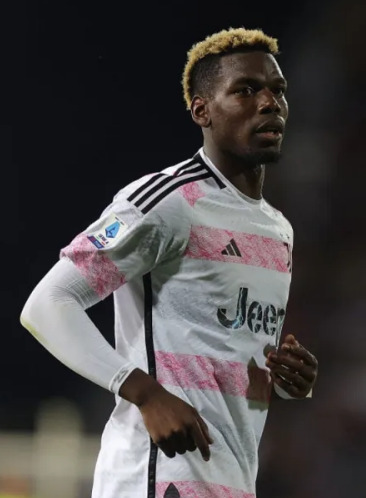
I Don't recall anyone saying this doping case came from italy itself, the italian government. It isn't uefa or fifa. HE will appeal through the european courts.
Paul Pogba releases statement after being hit with four-year football ban
Jamie Braidwood
Thu, Feb 29, 2024, 9:50 AM EST
Paul Pogba says he will appeal against his four-year ban from football after testing positive for a banned substance.
In a statement, the former World Cup winner and Juventus midfielder said he was “sad, shocked and heartbroken” after the ruling from Italy’s national anti-doping body.
Pogba insisted he has “never knowingly or deliberately” violated anti-doping rules after he tested positive for testosterone in September.
The France international was provisionally suspended before a counter-analysis on a second sample taken from Pogba also returned a positive result for testosterone.
Pogba turns 31 in March and would be nearing 35 by the end of the four-year ban if the punishment is upheld, potentially spelling the end of his football career.
In a statement, the former Manchester United player confirmed he would be taking his appeal to the the Court of Arbitration for Sport in Switzerland.
“I have today been informed of the Tribunale Nazionale Antidoping’s decision and believe that the verdict is incorrect,” Pogba said.
“I am sad, shocked and heartbroken that everything I have built in my professional playing career has been taken away from me.
“When I am free of legal restrictions the full story will become clear, but I have never knowingly or deliberately taken any supplements that violate anti-doping regulations.
“As a professional athlete I would never do anything to enhance my performance by using banned substances and have never disrespected or cheated fellow athletes and supporters of any of the teams I have played for, or against.
“As a consequence of the decision announced today I will appeal this before the Court of Arbitration for Sport.”
Pogba won the World Cup with France in 2018, two years after he became the most expensive footballer in the world when Manchester United signed him for a record £89m.
One of the most exciting midfielders of his generation when at his peak, Pogba played a key role in France’s World Cup win but he often struggled to live up to expectations at Old Trafford.
In six years, Pogba won the Europa League and Carabao Cup but United failed to compete for the biggest trophies on a regular basis in a disappointing period for the club overall.
Pogba returned to Juventus, the club where he first established himself as one of the most exciting midfielders in the world and won four Serie A titles between 2012 and 2016, but struggled with injuries.
After missing the World Cup in December 2022, Pogba was looking to return to the Juventus team at the start of the season in August. He was an unused substitute in Juventus’s 3-0 win against Udinese on the opening day of the season before making appearances off the bench against Bologna and Empoli.
https://sports.yahoo.com/paul-pogba-releases-statement-being-141042332.html
#RMSoccer
0 notes
Text

FULL NAME: alexander josiah neher
NICKNAME(S): alex , the goat ( keeper ) , the wall , snapper , sweeper keeper
BIRTH-DATE: march 27, 1986
CURRENT AGE: 37yrs old
ZODIAC: aries
BIRTHPLACE: gelsenkirchen , germany
FAMILY: emilia & leon neher ( mother & father ) , mattias neher ( brother ) , davina claire ( cousin from mother's side though, like a little sister figure in his life )
LANGUAGES: german [ native language ] , english [ fluent ] , french [ conversational ] , greek [ conversational ]
OCCUPATION: professional soccer/football player ( fc bay.ern / germany nati.onal team , #1 goalkeeper & captain . )
ACCOMPLISHMENTS:
FIFA World Cup winner (2014), third place (2010)
UEFA Champions League 2013, 2020
Bundesliga 2013, 2014, 2015, 2016, 2017, 2018, 2019, 2020, 2021, 2022, 2023
DFB Cup 2011, 2013, 2014, 2016, 2019, 2020
FIFA Club World Cup 2013, 2020
UEFA Super Cup 2013, 2020
DFL Supercup 2012, 2016, 2017, 2018, 2020, 2021
UEFA European Under-21 Championship 2009
The Best FIFA Goalkeeper 2020
World’s Best Goalkeeper (IFFHS) 2013, 2014, 2015, 2016, 2020
German Player of the Year 2011, 2014
FIFA World Cup Golden Glove 2014
PERSONALITY: gentle + charming + determined + honest + easy going. short temper [ during game / practice ] - rash [ at times ] - arrogant -aggressive.
0 notes
Text
Qatar 2022: A Fairy-Tale Ending and The Success of Sportswashing
December 18th saw one of the greatest World Cup finals: Argentina will be going home as Campeones del mundo. Lionel Messi got his fairy-tale ending, a trophy that had eluded him was now his. Any doubts of being one of, if not the greatest player to ever play the beautiful game are now muted. However, Messi and Argentina aren’t the only winners from the World Cup.
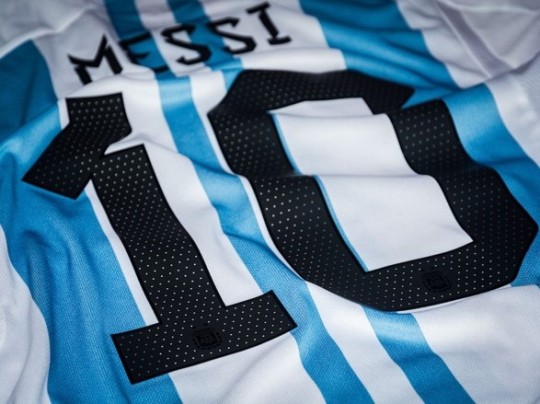
Qatar will view the tournament as a success: dramatic exits from the group and knockout stages; underdogs beating tournament favourites; the first African team reaching a semi-finals and a final for the archives. There have been an abundance of positive headlines from this tournament which is exactly what the host nation wanted.
Since their questionable awarding in 2010 to host the tournament, the country has been hounded by the media, human rights and LGBTQ groups over their eligibility to host the event. With bribes being taken for votes, homosexuality being illegal and women’s rights being restricted, to 6500 migrant workers dying to build the stadiums. This tournament was always destined to be overshadowed by immorality.
Attaining the World Cup can be seen as a form of sportswashing, this being the use of sport to divert attention away from any moral violations to improve their image. With the 2018 iteration being viewed by over 3.5 billion people, this was Qatar’s stage to appeal to the globe as a nation of great wealth and infrastructure. Utilising the tournament to divert consumers attention away from media outlets who brought their human, women’s and LGBTQ rights violations to their attention. The tournament will divert attention away from media outlets who brought the attention of the human, women’s and LGBTQ rights violations forwards.
With the final being the spectacle it was, there is no doubt the majority of viewers will claim it to be one of the great World Cups, despite the off pitch political issues. This is how Qatar can be seen as winners from this tournament, remembered by many for hosting ‘Messi’s World Cup’.
Despite the success, there were many who objected to the country hosting the tournament, vowing to boycott the tournament, not watching a single minute. Boycotts when collaboratively arranged can be effective and achieve desired results. With the size of FIFA it could take a sizeable number of participants, major nation(s), star player(s) plus a firm stance vowing not to take part to make an impact.
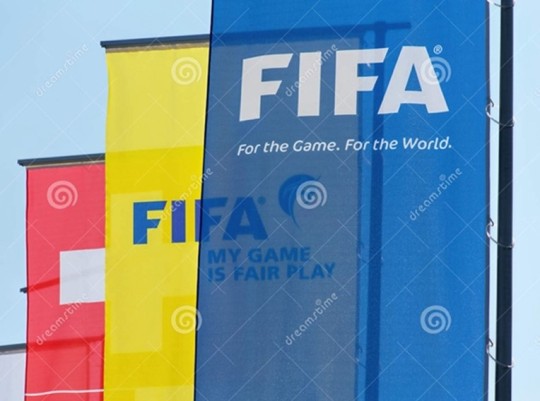
The World Cup has heritage and prestige and is one of the largest competitions, therefore demand is always there. If fans choose not to watch, there will be other fans to make up for them, likewise tickets to matches. If nations decide to boycott the tournament there are other nations there to take place. Not every nation qualifies and taking part in one of the biggest tournaments in the world could be a first for them.
When boycotting against large organisations it’s unlikely you’ll impact the revenues, instead the focus needs to be on impacting reputations, generating negative media coverage. For a boycott to work in this situation it needs a sizeable following, the viewing numbers and attention partnered sponsors receives would need to be reduced significantly. Substantial planning and time is required for them to be successful. If the movement generates momentum early the chances of it being successful will increase, and the likelihood FIFA takes any action may increase as they have more time to consider their options.
Unfortunately, it would be unlikely FIFA and any sponsors would have revenues impacted by these boycotts. With the status the World Cup has and the number of spectators it brings in, it’s hard to see any boycotts being successful in reducing the revenue they bring in. They can however impact their reputation which can affect them now and in the future. In spite of the initial backlash, individuals boycotting and nations speaking out, the tournament still went ahead and was a success for the host nation, FIFA and those who watched along.
N0879313
2 notes
·
View notes